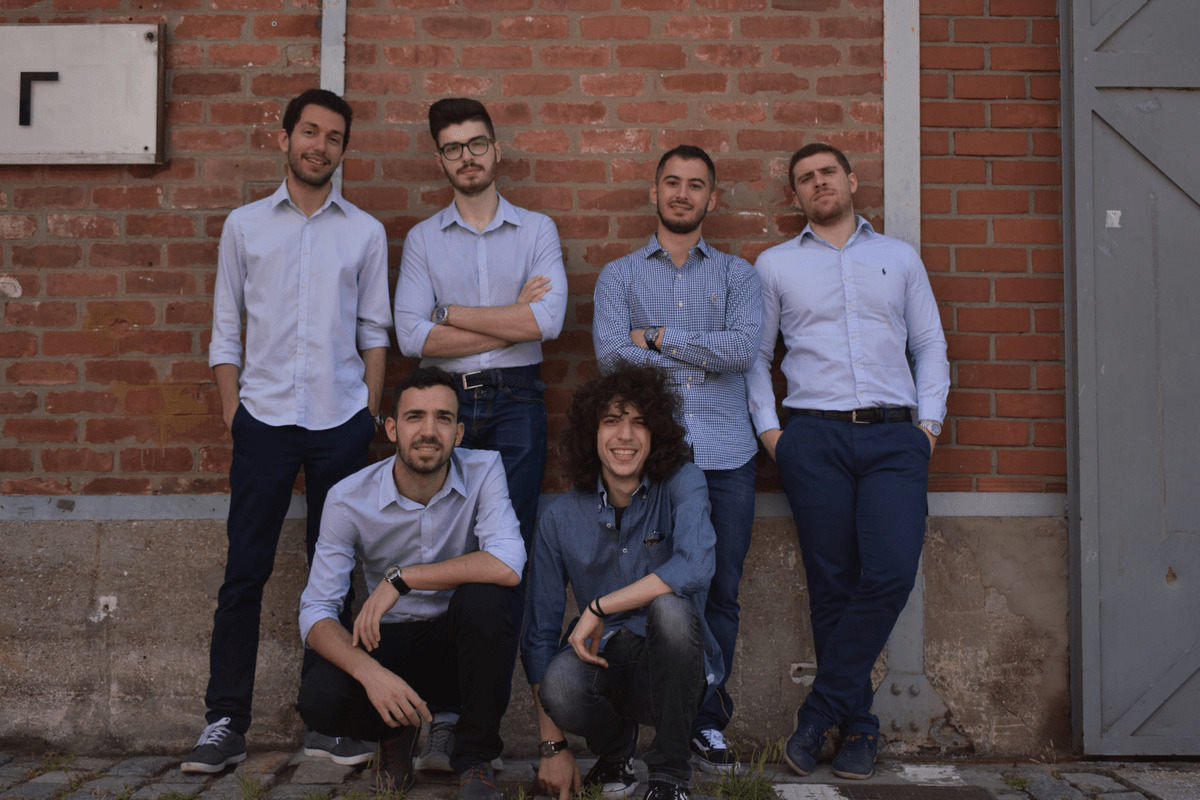When we hear the word “flow” our mind goes to a continuous movement of a form of matter in space. This is exactly what 6 fellow students and friends of the Department of Civil Engineering of the Aristotle University of Thessaloniki are pursuing, with areas of specialization in transport and energy: Flow in our transportation, in our everyday life, in our lives, where everything flows smoothly, easily, unhindered and evolves.
This philosophy of evolution is also behind the services provided by the startup under the name Rhoé Urban Technologies, which as a company, with legal form, operates in the market for the last 3 years.
The 6 fellow students and friends, having the experience of moving to their city, Thessaloniki, were often concerned about how urban transportation could be improved and at the same time more environmentally friendly solutions could be adopted.
From the effort to satisfy these concerns Rhoé emerged, which began as a research team of AUTh with field of study the urban sustainability and aimed at seeking solutions that would make urban transport friendlier to the citizen and the environment and cities more “smart.’’
Along the way, they noticed the gap in the market around technology in the field of mobility and energy and thus made their first business step. Today they are active in the areas of urban mobility and green energy trying to contribute to the massive shift to more sustainable and clean forms of transport and energy, developing optimization software with state-of-the-art technologies.
However, Rhoé’s story begins much earlier, in 2016, when the 6-member company, as a research team of the Aristotle University of Thessaloniki, had participated and had distinguished in several competitions for the innovation of urban mobility solutions, until its steps lead it to the door of “OK! Thess“, an incubator for startups.
There, thanks to the advisory support and guidance, but also to the knowledge it received, it managed in less than a year to come out on the market with its first product. In 2019, Rhoé’s team attracted the press with the “digital assistant” with a mobile handheld printer for Municipalities, which it created, that facilitates the municipal authorities in certifying violations of the Traffic Code.

The Director of Marketing and one of the co-founders of Rhoé, Aimilios Mouchtaropoulos, describes in Startupper.gr the course of the project so far and the future plans, the services provided and the important projects that “Rhoé is running today, as well as the difficulties in facing any challenge that is an obstacle to the transition to a more sustainable future.
Startupper.gr: For what purpose was the company founded?
Aimilios Mouchtaropoulos: The company’s aim is to play a leading role in the transition to more sustainable, resilient and green cities by applying innovative mobility and energy technologies in the market, both in collaboration with the research sector and by giving the space to Greek industrial research.
We believe that one of the main problems at the moment in Greece is the inability to transfer high levels of research and technology from universities and research centers to the market. We aspire to be the first and the best in matters of new technologies that apply solutions which until recently citizens considered either sci-fi, or lost in the closet of a scientist.
In the future, we aim at an aggressive expansion in markets in Europe, Asia and North America – markets which along with Greece have mature ground for the future of transport and energy, but also at expanding our partnerships with major companies in Greece and abroad. But above all we want to inspire new ideas, implement models and fail as many times as necessary until we find out exactly what works. For us, research is the future but also our future is research.
Startupper.gr: What are the services you provide today? Which institutions do you work with and what feedback do you get?
Aimilios Mouchtaropoulos: Our services are addressed to national or local administrations, research centers and businesses and include transportation models, forecasting models, data analysis, optimization in energy use, machine learning models and platform development.
The most important feedback we receive from our collaborations with the above organizations on various innovative projects around green mobility and energy, is that our services usually offer that “ingredient” which makes any solution stand out, as optimization is something that today everyone in the market is looking for.
Startupper.gr: What do you consider to be your top projects and how many do you “run” today?
Aimilios Mouchtaropoulos: The top projects in our company’s portfolio are electric vehicle charging plans (S.F.I.O.) and Current Direct. The first relates to the development of strategic plans for the installation of charging stations in greek municipalities, to which the team contributes with an innovative algorithm it has developed on the basis of which the trend in the electric vehicle market is calculated and the optimal points for the installation of electric charging stations are proposed.Installation of electric vehicle charging stations is based on a wide range of criteria; The second is a research project, funded by Horizon 2020, which studies electromobility in maritime transport through an interchangeable battery system.
This project involves 13 partners from all over Europe, each offering the know-how and expertise in their field. What we offer is the development of an Energy-as-a-Service platform.which essentially acts as the brain that manages the entire business environment of the alternating battery system and optimizes its parameters (e.g. spatial planning of the stations, infrastructure development, forecasting for the demand of batteries, smart charging of them at off-peak hours so as not to overload the network, optimization in the pricing of the end user who pays exactly for the energy consumed, etc.)
Here we should clarify that a project is defined as any project that has a beginning, a middle and an end. We are currently running a total of 10 projects – some in the planning phase and others in implementation – from a wide range of fields such as electromobility, mobility, or micromobility and energy markets.
Startupper.gr: Can you give us some insights into the evolution of the company?
Aimilios Mouchtaropoulos: The company’s staff currently consists of 8 people, 6 co-founders and 2 employees, while the interviews for the recruitment of 2 more people have just been completed these days. The headquarters of the company are located where the team started, in Thessaloniki, and recently we moved to our new offices in the city center. As three indicative figures of the company’s development compared to the previous year, I would say 5 times the 5-fold increase in turnover, the 2-fold increase in the number of projects we “run” and the volume of work that increased so much that it allows the recruitment of 4 new people.
Startupper.gr: How have you funded your project so far?
Aimilios Mouchtaropoulos: The company as a “new entry” in the ecosystem in which it operates, chose at its beginning to explore with some independence its potential in it and did not chase an investment, but instead preferred to cover its own needs through its collaborations and the cash prizes it won in competitions.
After all, there was no investor with whom to match our team to the extent that we would want. The only funding we received in our course so far was from Horizon 2020 in the framework of the Current Direct research program. The truth is that when someone invests in a company, he acquires an active participation in it. Of course, as time goes by and we evolve, we do not exclude this possibility in the future.
Startupper.gr: How do you see the country’s transition to a digital reality and how do you expect the urban mobility industry to evolve in the coming years?
Aimilios Mouchtaropoulos: The truth is that Greece was well behind in the field of digital transformation, but due to the pandemic it was forced to turn to the adoption and adaptation of digital technological solutions, but this does not mean that it has reached the desired level compared to other European countries.
The problem is mainly that at this stage the country is facing the digital transformation more in the form of a technology project than a more general culture that must be incorporated into our everyday life in order to shape and develop it.
Urban mobility has been of particular concern to the EU recently, which has increased its funding for similar projects in order to make travel not only easier but also more sustainable, a goal which is also a guideline for the urban mobility sector.
We are seeing an improvement in public transport in quality and quantity, a decrease in private car users, an increase in micromobility solutions (e.g. electric scooters) and certainly the increasingly intense shift to greener forms of energy (e.g. electricity). Everything shows that mobility has shifted towards sustainability, which with the passage of time will become more and more clear and necessary for those who have been left behind.
This is also evident in the effort to develop the necessary background for the adoption of cleaner forms of energy and greener solutions in our transportation, both through the creation of the necessary infrastructure, as well as with the incentives given or expected to be given for the above purpose. Undoubtedly, technology plays a key role, acting as a “key” tool in shaping a more sustainable urban mobility, but that alone is not enough.
Factors such as the state in terms of incentives that will push citizens to adapt sustainable solutions to their daily commute, but also the personal responsibility and the “green” consciousness of the citizens themselves will act as catalysts for the future.
Startupper.gr: But cities are also the citizens themselves, who are called upon to adapt to a new reality. How feasible is this and what do you think should change in the mentality of the greek citizen?
Aimilios Mouchtaropoulos: As a country and as citizens of this country, we do not easily accept change or anything new that overturns the entrenched perceptions and knowledge and introduces new data into our lives. Especially when we talk about moving to greener cities, which is directly linked to the change in citizens’ consciousness, then the things are more difficult. Apart from the responsibility of the state to make the adoption of more sustainable solutions attractive, a decisive role is also played by the cultivation of environmental consciousness at an individual level, based on each of us to shape our everyday life.
However, due to the climate crisis, the time to achieve this is unfortunately tighter. However, several positive steps have been taken in our society regarding the change in the mentality of the greek citizen, which we find mainly in the younger generations. This gives us hope for a different tomorrow, where social environmental awareness will dominate and will be a way of life for each of us and will not be limited only to our transport but will concern every aspect of our lives

